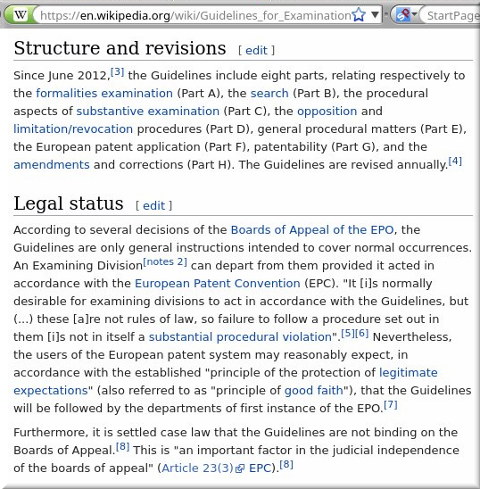

Examination fast-tracked for litigation if not blackmail purposes (putting the burden of proof on the accused). See "Guidelines for Examination in the European Patent Office".
THE EPO is weaponising its monopoly powers and arming patent aggressors; it gives "weapons" to firms that leverage totally bogus patents against rivals (we'll use Qualcomm as a new example in our next post).
"The EPO no longer cares about quality of patents; the only "quality" it seems to understand is speed of granting."Some firms are looking to exploit these declining standards with self-promotional announcements, seminars, events, brochures and so on. Just before the weekend we saw some in Business Wire (press release) at least a couple of times, the Associated Press wire several times and PR Newswire (press release). They just try to shove lots of patents into the EPO, knowing perhaps that it has gotten a lot easier to have them accepted (even if courts later invalidate these).
What has the EPO become? Who will benefit from this?
We have meanwhile noticed that Liz Cohen from Bristows LLP is writing from the distant past again (27 September 2016). Their CMS is eternally broken and they don't even know how to use it. So many errors. Maybe she just updated a post of hers from 2 years ago after she had published this little piece and promoted it from an account that they've described as "Keeping you up to date with the latest Unified Patent Court and Unitary Patent news and developments" (it's actually a stream of jingoism and lies, sometimes fabrications).
"Wrongly-granted patents need not even go to/on trial; threat of litigation -- or blackmail -- is often enough."Cohen desperately uses as evidence of UPC "confidence" (don't laugh) a litigation 'industry' lobby doing a PR charade. This is laughable beyond belief, but this is the sort of propaganda we've become accustomed to seeing at Bristows LLP. The EPLIT (European Patent Litigators Association) is cited as "proof" of UPC "confidence" and Cohen says "content of these three courses corresponds to the curriculum for the European Patent Litigation Certificate (EPLC), set out in Rule 3 of the draft EPLC Rules."
But there's no UPC; they are promoting a lie. Remember that CIPA lied along with Battistelli about UPC in the UK; that was before the Max Planck Institute issued an almost 200-page-long paper disputing it (recall Bristows' appalling response to it several days ago). Thankfully, if not very much belatedly, English-speaking sites talk about it. IPPro Patents wrote the following yesterday:
The continued participation of the UK in the Unified Patent Court (UPC) and unitary patent will “not be possible” post-Brexit, according to Matthias Lamping and Hanns Ullrich of the Max Planck Institute for Innovation and Competition. Lamping and Planck made the comments in a paper covering “the impact of Brexit on unitary patent protection and its court”.
In the paper, Lamping and Planck argued that the unitary patent system rests on two legally different but interconnected pillars.
These are EU Reg 1257/2012, on the implementation of enhanced cooperation by the creation of unitary patent protection, and the Agreement between the Member States of the EU on the establishment of the UPC.
The UPC will have exclusive jurisdiction over invalidation and infringement actions concerning the European patent with unitary effect and/or the classic European (bundle) patent.
However, as Lamping and Planck commented, the link between unitary protection of European patents and the UPC Agreement is not only one of jurisdiction, but also one of “substantive law”.
Two researchers at the Max Planck Institute for Innovation and Competition have argued that the UK will not be able to remain in the Unified Patent Court (UPC) Agreement after leaving the EU.
Matthias Lamping and Hanns Ullrich jointly published two studies in a paper called “The Impact of Brexit on Unitary Patent Protection and its Court”, where they argued that the inclusion of a post-Brexit UK in the Agreement will run contrary to the EU’s core values.
They said unitary patent protection cannot be dissociated from the “general legal order of the EU’s internal market” and be extended to the UK once it has left the EU.
In their National Bureau of Economic Research working paper From Revolving Doors to Regulatory Capture? Evidence from Patent Examiners (Sci-Hub Mirror), Business School profs Haris Tabakovic (Harvard) and Thomas Wollmann (Chicago) show that patent examiners are more likely to grant patents for companies that they subequently go to work for; they also go easier on patents applied for by companies associated with their alma maters (where they have more connections and will find it easier to get a job after their turn in government service).